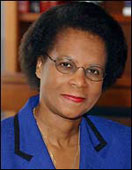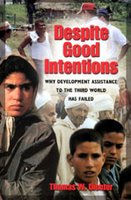 The Economist reports on a thriving resourceful expatriate Senegalese community- The Mourides:
The Economist reports on a thriving resourceful expatriate Senegalese community- The Mourides:
At his home in Touba, a pious but cosmopolitan place where local businesses boast of branches in every corner of the earth, one of Bamba's (founder of the Mourides) grandsons, Cheikh Ka, explains the doctrine of self-reliance. “If you depend on others,” he says, “you are not free—it is our philosophy of life.” Before he died Bamba expressed several wishes: in particular he hoped Touba, which he founded, would be a holy city. His extended family, the Mbacke, includes many marabouts, or religious teachers. What they teach includes hard work, self-reliance and solidarity. These ideas have propelled his followers out of their country in search of work, to send money back to their families, to support their marabouts (many of whom tour the world to visit disciples) and to develop Touba.
All these factors have helped make the Mourides one of the more successful African communities, at home and abroad. Wherever they are, they club together to acquire a mosque and community centre. Their networks help migrants leave Senegal, find work and procure documents. Far from being helpless victims of fate, many Mourides are shrewd operators in a complex, cross-border network. Take Alioune Ka, the owner of a wholesale shop close to Rome's Termini station: he is a brother of Cheikh Ka in Touba, who takes care of the Senegal-based members of the family. Alioune sells “ethnic” items to Senegalese (and others) who hawk them on streets or beaches. Some stock is from Senegal; a lot from Indonesia, Thailand or India.
The
formalization of
informal networks and
institutions such as these must be pursued. Too often what
really works is
is ignored because it doesn't wear the cloak of 'legitimacy'.
photo courtesy of the Economist









